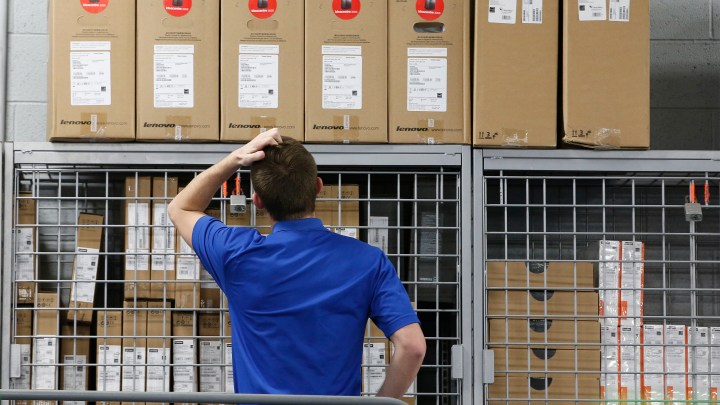
Business inventories decline, the largest dip since 2017

Business inventories fell 0.2% in November, according to the U.S. Commerce Department. It was the biggest drop since mid-2017.
Retail inventories fell 0.7% and motor vehicle inventories fell 1.8%. In October, inventories rose 0.1%.
Those business inventories represent stuff sitting on shelves waiting to be sold. It could be piles of 2-by-4-inch lumber at a wholesaler ready to be shipped to Home Depot, products sitting in Amazon warehouses that no one’s clicked to buy yet or dresses sitting on racks at Macy’s.
When business inventories fall it could mean a couple of things: Either stuff’s flying off the shelves because sales are up and the economy’s hot, or, said economist Ben Herzon at IHS Markit, “it could mean that spending is slowing down, production is slowing down.”
Herzon thinks that best explains November’s decline. He said businesses built up inventories in late 2018 and early 2019, when the economy was booming. Then they cut back later in 2019 as trade tensions — especially with China — were rising, and the economy was slowing.
That’s the case at Air Tractor, a company with 270 employees that makes aircraft for agriculture and forestry in Olney, Texas.
“We want to be careful to not get caught with too much inventory,” said Chief Financial Officer David Ickert. “We’ve slowed it basically just because of a matter of caution.”
Air Tractor’s business is heavily dependent on U.S. farmers, who’ve been suffering from the trade war. Ickert said domestic sales are down as a result, though export sales have increased to Brazil and other countries where soybean farmers have picked up business from China at the expense of U.S. producers.
Inventories are also down at Hawthorne Auto Clinic, a five-bay repair shop in Portland, Oregon.
“We’re going to a more on-demand system for stocking parts,” said service adviser Sarah Heidler.
She said suppliers have increased deliveries, meaning most repairs can still be done within 24 hours.
“It frees up shelf space and money,” she said. “We have seen an increase in parts prices, especially for things that have a lot of metal in them — batteries, things like that.”
Chalk that up to the Trump administration’s import tariffs as well.
There’s a lot happening in the world. Through it all, Marketplace is here for you.
You rely on Marketplace to break down the world’s events and tell you how it affects you in a fact-based, approachable way. We rely on your financial support to keep making that possible.
Your donation today powers the independent journalism that you rely on. For just $5/month, you can help sustain Marketplace so we can keep reporting on the things that matter to you.












